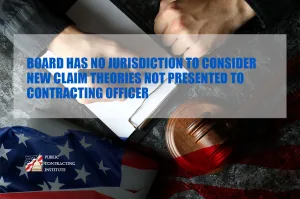One of the bedrock principles of the Contract Disputes Act (“CDA”) is that each claim by a contractor relating to a federal contract shall be submitted to the Contracting Officer (“CO”) for decision. 41 USC § 7103(a)(1). For a board or a Court to possess jurisdiction under the CDA, the contractor must have received a CO’s final decision or a deemed denial of a claim. But what happens when a contractor pursues new claims not presented to the CO? The result is clearly spelled out in Blanchard’s Contracting, LLC, ASBCA No. 62508, Feb. 23, 2021.

Blanchard was awarded a design-build contract by the Navy to furnish relocatable buildings. In April 2020 Blanchard submitted a claim to the CO for $73,000, claiming that the government had delayed the project by 119 days. The CO denied the claim, and Blanchard appealed to the Board on May 9, 2020. Soon thereafter, Blanchard filed a motion for summary judgment seeking an additional $50,000 for meeting with government officials and producing drawings. In its motion, Blanchard further sought $174,000 in a second delay claim that it stated was caused by electrical changes and increased requirements.
The Navy sought to dismiss for lack of jurisdiction both the drawing claim and the second delay claim because these issues were never submitted to the CO in a claim (The Navy did not seek to dismiss the original delay claim.)
The Board noted that two claims may be considered “the same” for CDA purposes if “they arise form the same operative facts, claim essentially the same relief and merely assert differing legal theories for recovery. Scott Timber Co. v. United States, 333 F.3d 1358 (Fed. Cir. 2003). The Federal Circuit has also held that requests are different claims if either requests different remedies or asserts grounds that are materially different either factually or legally. K-Con Bldg. Sys. Inc. v. United States, 778 F. 3d 1000 (Fed. Cir. 2015)
Applying these tests, the Board concluded that the drawing claim was clearly a new claim because it was not a delay claim but a claim for additional/changed work, and was not presented to the CO. Therefore the Board lacked jurisdiction. Also, the Board considered the motion to dismiss the second delay claim, noting that none of the contractor’s assertions involving electrical changes or increased requirements were ever brought to the attention of the CO in a claim. The Board also lacked jurisdiction over this claim for the same reason.
Takeaway. A contractor may increase the dollar amount of its claim, but may not present new claims to the Board that were not presented to the CO. A contractor may, without changing operative facts, assert different legal theories for its recovery. But where a contractor requests different remedies (monetary or non-monetary), or asserts different legal or factual grounds, this is a new claim that must first be presented to the CO.
For other helpful suggestions on government contracting, visit:
Richard D. Lieberman’s FAR Consulting & Training at https://www.richarddlieberman.com/, and Mistakes in Government Contracting at https://richarddlieberman.wixsite.com/mistakes.
